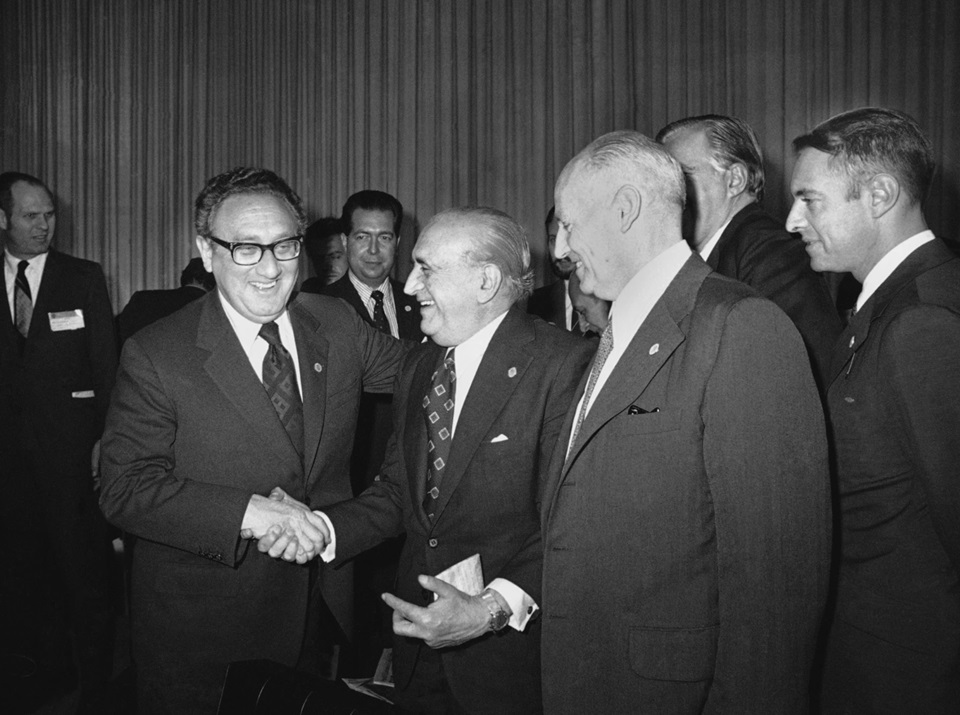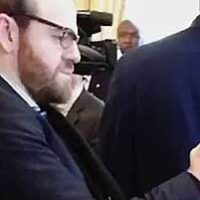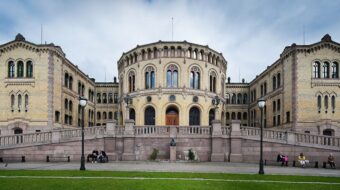
SANTIAGO, Chile (AP) — In Chile, leftists were tortured, tossed from helicopters and forced to watch relatives be raped. In Argentina, many were “disappeared” by members of the brutal military dictatorship that held detainees in concentration camps.
It all happened with the endorsement of Henry Kissinger, the former U.S. secretary of state who died Wednesday at age 100.
As tributes poured in for the towering figure who was the top U.S. diplomat under Presidents Richard Nixon and Gerald Ford, the mood was decidedly different in South America, where many countries were scarred deeply during the Cold War by human rights abuses inflicted in the name of anti-communism and where many continue to harbor a deep distrust of their powerful neighbor to the north.
“I don’t know of any U.S. citizen who is more deplored, more disliked in Latin America than Henry Kissinger,” said Stephen Rabe, a retired University of Texas at Dallas history professor who wrote a book about Kissinger’s relationship with Latin America. “You know, the reality is, if he had traveled once democracy returned to Argentina, to Brazil, to Uruguay — if he had traveled to any of those countries he would have been immediately arrested.”
There is likely no starker example of Kissinger’s meddling with democracy in the region and then supporting brutality in the name of anti-communism than Chile.
In Chile, Kissinger played a key role in the efforts to do everything in the United States’ power to undermine and weaken the socialist government of Salvador Allende, who was elected president in 1970. Kissinger then used his sway to prop up the military dictatorship of Gen. Augusto Pinochet, who rose to power in a 1973 coup, repeatedly refusing to call attention to the numerous human rights violations of Pinochet’s regime, which murdered opponents, canceled elections, restricted the media, suppressed labor unions and disbanded political parties.
Kissinger long alleged that he wasn’t aware of the human rights abuses that were committed in the region, but records show that this wasn’t the case, said Peter Kornbluh, a senior analyst at the National Security Archive that is in charge of its Chile project.
“The declassified historical record, the documents that Kissinger wrote, read and said, leave no doubt that he was the chief architect of the U.S. policy to destabilize the Allende government and that he was also the chief enabler of helping the Pinochet regime consolidate what became a bloody, 17-year infamous dictatorship,” Kornbluh said.
Kissinger was “somewhat obsessed” with Allende’s government, fearing that the rise of a socialist government through democratic means could have a contagion effect in the region, said Chilean Sen. José Miguel Insulza, a former secretary general of the Organization of American States who served as a foreign policy adviser in Allende’s government.
“For him, any action that meant defending the national interest of the United States seemed justifiable,” Insulza said.
Kissinger feared what Allende’s government could mean for the world.
“In geopolitical terms, Kissinger considered the rise of a left-wing coalition to power through democratic means even more dangerous than the example set by Cuba. Indeed, this could be replicated in Western countries with powerful communist parties in terms of electoral influence, such as in Italy,” said Rolando Álvarez, a history professor at the University of Santiago, Chile.
Kissinger was seemingly unaffected by tales of suffering at the hands of military officers, even though his own family arrived in the U.S. as refugees who had to flee Nazi Germany in his teens.
Did nothing about attacks on Jews
“By the end of 1976, State Department aides were telling Henry Kissinger, a Jew, that Jews were being targeted in Argentina,” Rabe said. “And Kissinger just didn’t do anything.”
In Chile’s neighbor, Argentina, a military junta rose to power in 1976 vowing to combat leftist “subversives.” Kissinger made clear he had no objections to their brutal tactics and repeatedly ignored calls from other State Department officials to raise more concerns about human rights violations.
In a June 1976 meeting, Kissinger had a message for Argentina’s foreign minister, Admiral César Augusto Guzzetti: “If there are things that have to be done, you should do them quickly.” He later reiterated that support during a meeting in October 1976 — a time when Argentine officials were worried the U.S. would raise human rights concerns amid increasing reports of torture and disappearances.
Guzzetti was “overjoyed” at the meetings, and “had felt that Kissinger had given him the signal that the United States had no objection to wholesale slaughter,” Rabe said.
Kissinger had a similar attitude toward other military dictatorships in the region, including in Uruguay and Brazil, and never raised objections to what was known as Operation Condor, a clandestine program that allowed military regimes in that part of the world to illegally pursue, detain, torture and assassinate political dissidents who fled their countries.
That attitude made a lasting imprint on Latin Americans’ psyche.
“At least here in Latin America, what I perceived in Henry Kissinger’s vision is very negative because it’s a kind of anything goes mentality. No matter how brutal the dictatorship is that must be supported, it doesn’t matter,” said Francisco Bustos, a human rights lawyer and professor at the University of Chile.
Decades later, the effects of that policy are still being felt in a region that feels the U.S. would go to any lengths to support its interests.
“There is a segment of political parties and movements in Latin America, including Chile, where the relationship with the United States is essentially marked by anti-imperialism. This perspective essentially sees any U.S. administration, whether Democratic or Republican, liberal, progressive, or ultraconservative, as more or less the same,” said Gilberto Aranda, an international relations professor at the University of Chile.
Although U.S. intervention in a region that was often referred to as “America’s backyard” has a long history, Kissinger seemed to take that into overdrive.
It’s no surprise then that one of the harshest reactions to Kissinger’s death came from a Chilean official.
“A man has died whose historical brilliance never managed to conceal his profound moral misery,” Chile’s ambassador to the United States, Juan Gabriel Valdes, posted on the social media platform X. Chile’s leftist President Gabriel Boric then retweeted the message.
We hope you appreciated this article. At People’s World, we believe news and information should be free and accessible to all, but we need your help. Our journalism is free of corporate influence and paywalls because we are totally reader-supported. Only you, our readers and supporters, make this possible. If you enjoy reading People’s World and the stories we bring you, please support our work by donating or becoming a monthly sustainer today. Thank you!













Comments